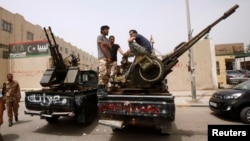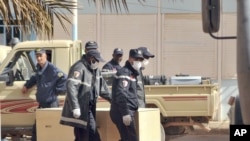BEIRUT —
Growing lawlessness in southern Libya and an influx of Islamist militants from Mali are stoking worries that Libya’s security weaknesses are fast becoming a destabilizing factor in the region.
A former Libyan intelligence source has told VOA that al-Qaida-linked jihadists driven out of Mali by a French-led offensive earlier this year have set up at least three jihadist camps in southern Libya in recent months.
As a consequence, the source said, Libya has now become the headquarters for al-Qaida in the Islamic Maghreb.
The situation has triggered criticism from neighboring sub-Saharan nations and has caused Libya to appeal for technical assistance from Europe to help police the nation’s long borders.
Libyan Prime Minister Ali Zeidan reacted angrily to accusations last month that suicide bombers behind twin blasts in Niger that killed 24 crossed over from Libya. What appeared to anger the Libyan leader the most was the claim by Niger officials that Libya was becoming a safe haven for militants affiliated with al-Qaida.
Zeidan insisted that Libya was working hard to be a good neighbor and that its own investigation had shown that no terrorists had crossed into Niger from Libyan territory.
In January, the Zeidan government was equally dismissive of Algerian claims that al-Qaida-affiliated militants used Libya to mount the deadly assault on an Algerian gas facility that left dozens dead. Algerian officials said the assailants wore Libyan military uniforms and drove vehicles with Libyan license plates.
Alarm rising over extremists in Libya
European officials have expressed their own concerns about the movement of radical Islamists into Libya. The terror group’s increased presence in Libya comes at a time the country is reeling from several threats to—or attacks on—Western targets.
French President Francois Hollande has pointed to Libyan lack of security as a cause for major worry. In May, the French embassy in Tripoli was bombed, and the French leader has argued publicly that there is a link between the bombers behind that attack and those responsible for the blasts in Niger on May 23.
Despite Zeidan’s public denials, he has started to focus attention on the south of Libya, and has been conferring with his officials to see what can be done to reverse what his aides say is a deteriorating situation in the south.
Zeidan also visited NATO headquarters in Brussels last week to seek assistance.
A team of NATO experts is due to arrive in Libya shortly to assess military training and border security needs. NATO’s secretary general, Anders Fogh Rasmussen, says technical aid “would be a fitting way to continue our cooperation with Libya after we successfully took action to protect the Libyan people two years ago.”
In May, an advance team of border security experts from the European Union arrived in Tripoli to start up a mission separate from NATO to provide technical assistance and advice.
Libya has been plagued by instability since the overthrow of Colonel Moammar Gadhafi 18 months ago.
Army and police barely functioning
The country’s army and national police are barely functioning and the Libyan government has had to deputize revolutionary militias to fill the security vacuum. In late April, those same militias blockaded key government ministries to force through reforms they wanted.
In addition, there has been episodic fighting in the south and east of the country between the Tabu, a non-Arab African minority in Libya, and the Zway, an Arab tribe. The two groups have had long-running disputes over identity and control of resources and experts say the resulting lawlessness has allowed the jihadists to establish themselves in the area.
And one expert, Frederic Wehrey, at the Carnegie Endowment in Washington, says the government policy of allowing militias and tribal elders to mediate such disputes is only aggravating the ethnic rivalry.
“This informal strategy has failed to provide lasting peace or address the entrenched roots of the conflict,” Wehrey concluded in a recent study. “In some instances, it has ended up inflaming tensions even more.”
He said the militias had adopted a partisan approach, siding all too often with the Zway.
Joint efforts to police the tri-border region between Libya, Chad and Sudan have been plagued by disputes and lack of coordination, say UN officials.
The chief of staff of the Libyan Border Guard Force, Brigadier General Abdul-Khaleq Al-Senussi, acknowledges that regional security will partly depend on how effective Libya is in securing its borders. “We need everyone to stand by us and help us,” he said recently.
A former Libyan intelligence source has told VOA that al-Qaida-linked jihadists driven out of Mali by a French-led offensive earlier this year have set up at least three jihadist camps in southern Libya in recent months.
As a consequence, the source said, Libya has now become the headquarters for al-Qaida in the Islamic Maghreb.
The situation has triggered criticism from neighboring sub-Saharan nations and has caused Libya to appeal for technical assistance from Europe to help police the nation’s long borders.
Libyan Prime Minister Ali Zeidan reacted angrily to accusations last month that suicide bombers behind twin blasts in Niger that killed 24 crossed over from Libya. What appeared to anger the Libyan leader the most was the claim by Niger officials that Libya was becoming a safe haven for militants affiliated with al-Qaida.
Zeidan insisted that Libya was working hard to be a good neighbor and that its own investigation had shown that no terrorists had crossed into Niger from Libyan territory.
In January, the Zeidan government was equally dismissive of Algerian claims that al-Qaida-affiliated militants used Libya to mount the deadly assault on an Algerian gas facility that left dozens dead. Algerian officials said the assailants wore Libyan military uniforms and drove vehicles with Libyan license plates.
Alarm rising over extremists in Libya
European officials have expressed their own concerns about the movement of radical Islamists into Libya. The terror group’s increased presence in Libya comes at a time the country is reeling from several threats to—or attacks on—Western targets.
French President Francois Hollande has pointed to Libyan lack of security as a cause for major worry. In May, the French embassy in Tripoli was bombed, and the French leader has argued publicly that there is a link between the bombers behind that attack and those responsible for the blasts in Niger on May 23.
Despite Zeidan’s public denials, he has started to focus attention on the south of Libya, and has been conferring with his officials to see what can be done to reverse what his aides say is a deteriorating situation in the south.
Zeidan also visited NATO headquarters in Brussels last week to seek assistance.
A team of NATO experts is due to arrive in Libya shortly to assess military training and border security needs. NATO’s secretary general, Anders Fogh Rasmussen, says technical aid “would be a fitting way to continue our cooperation with Libya after we successfully took action to protect the Libyan people two years ago.”
In May, an advance team of border security experts from the European Union arrived in Tripoli to start up a mission separate from NATO to provide technical assistance and advice.
Libya has been plagued by instability since the overthrow of Colonel Moammar Gadhafi 18 months ago.
Army and police barely functioning
The country’s army and national police are barely functioning and the Libyan government has had to deputize revolutionary militias to fill the security vacuum. In late April, those same militias blockaded key government ministries to force through reforms they wanted.
In addition, there has been episodic fighting in the south and east of the country between the Tabu, a non-Arab African minority in Libya, and the Zway, an Arab tribe. The two groups have had long-running disputes over identity and control of resources and experts say the resulting lawlessness has allowed the jihadists to establish themselves in the area.
And one expert, Frederic Wehrey, at the Carnegie Endowment in Washington, says the government policy of allowing militias and tribal elders to mediate such disputes is only aggravating the ethnic rivalry.
“This informal strategy has failed to provide lasting peace or address the entrenched roots of the conflict,” Wehrey concluded in a recent study. “In some instances, it has ended up inflaming tensions even more.”
He said the militias had adopted a partisan approach, siding all too often with the Zway.
Joint efforts to police the tri-border region between Libya, Chad and Sudan have been plagued by disputes and lack of coordination, say UN officials.
The chief of staff of the Libyan Border Guard Force, Brigadier General Abdul-Khaleq Al-Senussi, acknowledges that regional security will partly depend on how effective Libya is in securing its borders. “We need everyone to stand by us and help us,” he said recently.





